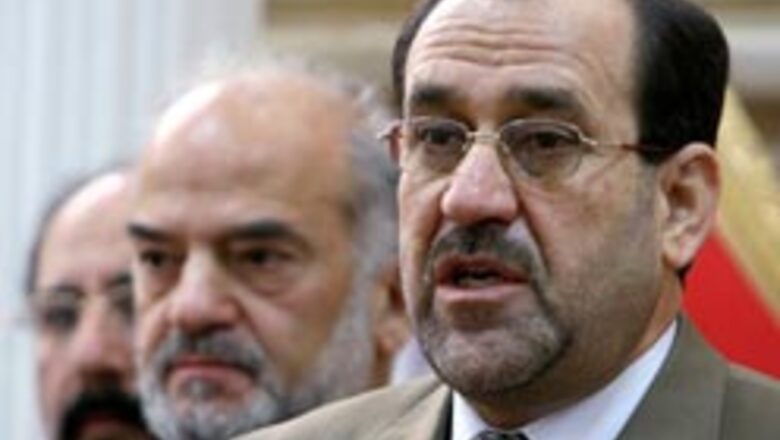
views
Baghdad: Iraq finally has names for its top jobs - more than four months after its historic general election.
A political deadlock appears to have been broken on Saturday, with Jawad al-Maliki asked to be prime minister-designate and form a new government.
Al-Maliki, a Shiite, was nominated a day earlier to replace interim Prime Minister Ibrahim al-Jaafari who had been at the center of an impasse between Iraq's political parties.
Al-Maliki was asked to form an administration by Jalal Talabani, a Kurd, who was re-elected president by the parliament.
The prime minister designate has a month to choose his ministers and present the list to parliament, acting parliament speaker Adnan Pachachi told CNN.
If parliament votes in favor, the government will begin work. But if al-Maliki's cabinet fails to gain support, someone else will be appointed to form a government, Pachachi said.
On Friday, the Shiite-led political bloc, the United Iraqi Alliance, put forward al-Maliki of the Dawa Party as its candidate to replace al-Jaafari.
Chosen as the new speaker of the Council of Representatives on Saturday was Sunni Arab politician Mahmoud al-Mashhadani. A Shiite, Khalid al-Attiya, and a Kurd, Aref Tayfour, were elected as his deputies.
A total of 266 members from the 275-seat body gathered for the key meeting, which had been delayed repeatedly and was finally held more than four months after the general election.
Before parliament convened, several members joined al-Maliki and U.S. Ambassador to Iraq Zalmay Khalilzad to iron out details on what would unfold.
Calls for unity
On Saturday before the parliamentary gathering, al-Maliki called for a government of national unity "to eradicate injustice that the Iraqis have suffered." He also urged Sunnis, Shiites, Kurds, Assyrians, Chaldeans and Yezidis to unite.
"We will work as one family to lead the political process, not based on our differences, sects or parties," al-Maliki said at a press conference before the parliament meeting.
A top Sunni Arab leader endorsed al-Maliki's selection.
"We will deal with Mr. [al-]Maliki and we will work together in order to form a unity government," said Tariq al-Hashimi - secretary-general of the Iraqi Islamic Party, the largest party in the most powerful Sunni Arab political bloc - the Iraqi Accord Front.
The main Kurdish grouping has not commented so far but independent Kurdish politician Mahmoud Othman welcomed al-Maliki's nomination, Reuters reported.
"It looks like there's movement and that's good news," US Secretary of State Condoleezza Rice told reporters in Washington.
Sunnis, Kurds and secularists opposed al-Jaafari as prime minister, citing weak leadership and sectarian strife that they say persisted under his watch.
In addition, the Interior Ministry, led by a Shiite, was particularly criticized for allowing Shiite militias to infiltrate its ranks and patrol the streets.
On Saturday, al-Maliki addressed militias, saying "Arms should be in the hands of the government. There is a law that calls for the merging of militias with the armed forces."


















Comments
0 comment